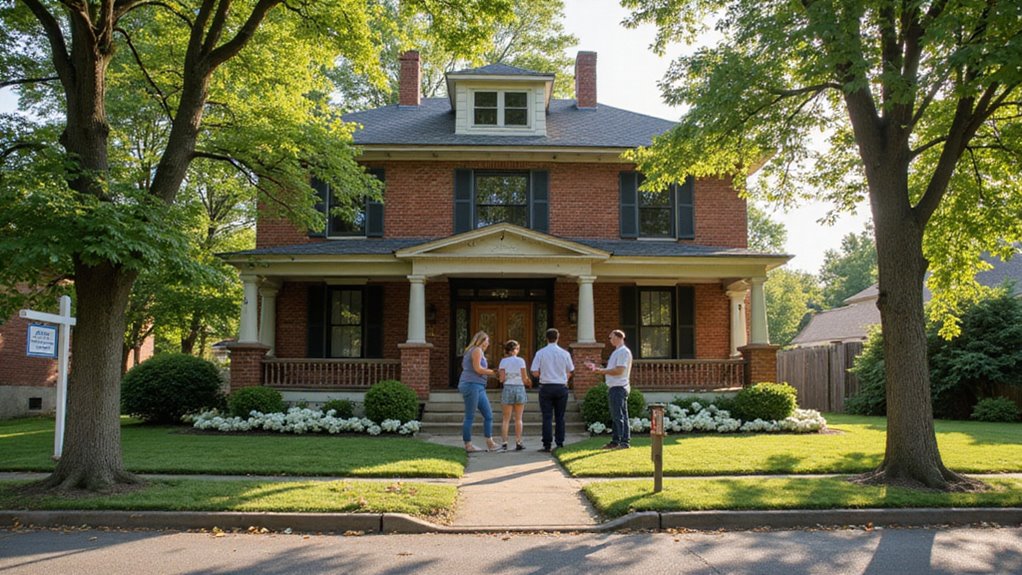Selling a House in Probate in Cincinnati




Selling a house in probate in Cincinnati can feel overwhelming. You must follow strict probate laws and meet important deadlines. Many families feel lost when handling legal documents and court procedures.
Mistakes in probate sales can lead to delays, extra costs, or even court disputes. The process is complex and often confusing without the right knowledge. You may worry about protecting the interests of all beneficiaries.
The best way to sell a house in probate in Cincinnati is to understand each legal step and follow the correct process. Simple guidance can help you avoid costly errors and move forward with confidence. This blog will guide you through each step and help you solve the challenges of selling a probate house in Cincinnati.
Table of Contents
Understanding Probate Properties in Cincinnati

Probate properties in Cincinnati are homes that go through a legal process after the owner dies. Probate court decides how the property is handled and who receives it. The court makes sure everything is done by Ohio law.
Estate valuation is an early step in probate. You must find the current market value of the property. This helps the court decide taxes, fees, and inheritance.
You will need documents like appraisals and market reports for the court. If you stay organized, the process can move faster. Proper paperwork can prevent delays or conflicts among heirs.
How to Sell a House in Probate in Cincinnati
To sell a probate property in Cincinnati, you’ll need to gather specific documents, understand the typical probate timeline, and confirm who’s legally authorized to complete the sale. Each step requires careful attention to local court procedures and state laws. Let’s break down exactly what you need to keep the process on track and avoid delays.
What Documents Do You Need for a Probate Sale?
How Long Does Probate Take in Cincinnati?
Who Has the Authority to Sell a Probate Property?
For a probate sale, you need several key documents. You must have the will, death certificate, and Letters of Authority from the probate court. These prove you have legal permission to sell the property.
You should also collect the property deed, mortgage statements, and recent tax assessments. Insurance documents are necessary to show the property is covered. If you want a strong sale price, keep records of home improvements or staging.
A neighborhood valuation can help you set a fair price. Ohio law requires you to provide disclosure forms about the property’s condition. If you gather all these papers early, the sale process will move faster and more smoothly.
Probate in Cincinnati usually takes six months to over a year. The exact time depends on the estate’s details and court workload. Knowing the steps can help you plan ahead.
Probate starts when you file a petition with the Hamilton County Probate Court. Approval from the court can take several weeks. The process is not instant and often requires patience.
Next, the estate assets are listed and appraised. This includes the home and any valuables. Preparing the house and checking similar sales can help get a better price.
Creditors must be paid before anything else. This stage can last a few months if there are many debts. Delays may happen if creditors contest claims.
The sale and distribution happen after all approvals. The court must allow the sale before you can close it. Only then are the proceeds divided among heirs.
A probate property can only be sold by the estate’s personal representative. This person is either the executor named in the will or an administrator chosen by the court. Without this official appointment, no one else can legally sell the property.
The personal representative manages the property, arranges an appraisal, and handles offers. If the will names an executor, that person follows the instructions in the will. If there is no will, the court appoints an administrator to manage the estate.
Other professionals may help during the sale. An attorney gives legal advice to the personal representative. An appraiser sets the property’s value, and a probate judge approves key steps in the process.
Having the court’s approval and the right legal authority makes the sale valid. Proper authority helps avoid legal issues and delays. If you follow these steps, you can sell a probate property smoothly.
Legal Requirements for Selling Probate Property
When selling probate property in Cincinnati, you’ll need to secure court approval before moving forward. It’s also essential to set a fair price and address the interests of all beneficiaries to prevent disputes. By following these legal steps, you’ll keep the sale process on track and compliant with Ohio law.
Getting Court Approval
Setting the Right Price
Handling Multiple Beneficiaries
To sell a house in probate in Cincinnati, you must get approval from the court. Ohio law requires this step before any sale. The process protects the interests of all heirs.
Start by preparing the property for sale. If needed, stage the home to make it look appealing. A neighborhood comparison can help show the court the home’s value.
File a petition with the probate court to ask for permission to sell. Provide a list of all estate assets, including any home improvements and value comparisons. Notify all interested parties so they can voice concerns if they have any.
Attend the court hearing to get final approval before selling the house. Only after the court agrees can you list or sell the property. Following these steps ensures a legal and fair sale.
Setting the right price for a probate property in Cincinnati means following certain legal steps. The court often requires a professional appraisal to decide fair market value. This rule helps make sure the property is not sold for less than it is worth.
A court-approved appraisal will set the lowest price you can accept. If you want to get more, you can stage the home to make it look its best. Staging usually draws more buyers and may lead to higher offers.
You should also study recent sales in the neighborhood. A good neighborhood analysis helps you pick a price that matches local trends. If your price is too high or too low, buyers may lose interest.
Follow these steps to meet court rules and attract serious buyers. This approach protects everyone involved and helps you sell the property at a fair price.
To ensure a smooth sale with multiple beneficiaries in a Cincinnati probate property, follow clear steps and keep everyone informed. Each beneficiary has legal rights and responsibilities that must be respected. Accurate estate valuation and open communication are essential.
Professional estate valuation gives a fair market value and prevents arguments. If all parties agree on the value, the process moves faster. Disagreements can slow down the sale.
Written agreements help avoid confusion later. If beneficiaries communicate openly, there is less risk of conflict. Always keep records of every decision.
A probate attorney can guide you through legal steps. If you meet all legal requirements, the sale will be valid. Legal advice helps prevent mistakes and delays.
Common Challenges in Probate Sales
When selling a house in probate, you’ll face challenges like ongoing property maintenance, settling outstanding debts, and addressing buyer concerns. It’s important to stay organized and tackle each issue as it arises to keep the process on track. By anticipating these common hurdles, you can protect the estate’s value and enable a smoother sale.
How to Deal with Property Maintenance?
Property maintenance is important during probate sales to keep the house in good condition. Good maintenance helps preserve property value and attracts buyers. If you ignore upkeep, the home may lose value and become harder to sell. A full inspection can help you find urgent problems early. Issues like leaks or faulty wiring need fast attention to avoid bigger costs. If you wait too long, small problems may become expensive repairs.
Yard care is also important because buyers notice the outside first. Overgrown lawns and bushes can turn buyers away. Basic landscaping, like mowing and trimming, makes the property look cared for. Routine cleaning and small repairs should be scheduled regularly. If you spot a minor issue, fix it quickly to prevent damage. You should hire professionals for jobs you cannot do safely yourself.
What If There Are Outstanding Debts?
Outstanding debts must be paid before you can distribute any inheritance. If there are debts, you must handle them first. Creditors get paid from estate assets, which may include selling the house. Estate planning can help you find and rank these debts. In Cincinnati, inheritance laws say all debts need to be settled from the estate. If you skip this step, it can delay the process.
Different debts require different actions. You must pay off the mortgage at closing. Property taxes and utility bills should be settled before you transfer ownership. Medical bills and credit cards can be paid from the sale proceeds. If you handle debts properly, the probate process will move faster. Always check each debt before moving forward.
Managing Buyer Expectations
Managing buyer expectations means helping buyers understand how probate sales are different. Buyers must know that the process, timeline, and property condition may not match a regular sale. If you explain these differences early, buyers can make better decisions. The probate process has extra steps and may take longer. Buyers should know about court approvals and possible delays. If you explain the timeline, buyers will be less likely to get frustrated.
Probate properties usually sell “as-is.” Buyers should expect that repairs are not common in these sales. If buyers want a move-in ready home, they may need to look elsewhere.
The price of a probate home often reflects its condition. You should provide clear reasons for the asking price. If buyers question the price, market data can help support your explanation. Closing dates in probate sales are often uncertain. Court schedules can cause unexpected changes. If buyers are flexible, the process will go more smoothly.
Submit Your Information Below For A Cash Offer On Your Property
Financial Aspects of Probate Sales
When selling a house in probate, you need to account for specific costs, tax responsibilities, and how the proceeds will be distributed. It’s crucial to understand court fees, potential capital gains taxes, and the order in which debts and heirs are paid. By clarifying these financial aspects upfront, you can avoid costly surprises and keep the process on track.
Understanding Probate Costs
Probate costs are extra expenses you must pay when selling a house in probate. These costs can reduce the money you receive from the sale. It is important to know about them before starting the probate process.
Probate courts often require these payments before you can distribute estate assets. You should plan for these costs to avoid delays. Careful budgeting helps the process go smoothly.
Common probate costs include court fees, which are charges for filing and handling paperwork. Attorney fees may apply if you need legal help with probate rules. Appraisal fees pay for professional property valuation, and executors may also receive compensation for their work.
Tax Implications
Selling a house in probate may lead to tax consequences. You should review capital gains taxes and how inheritance laws affect your case. If the property increased in value after the owner died, you might owe taxes.
A stepped-up basis can reduce capital gains if the home’s value rose. Estate tax exemptions may apply, depending on your situation. Always keep clear records and paperwork for tax reporting.
Consulting a tax professional can help you meet Ohio’s rules. Careful planning may lower your tax bill. This approach helps you protect the estate’s value.
Distribution of Proceeds
The probate court approves the sale and closing of the house. Afterward, the money is divided according to the will or Ohio law. The executor must follow specific steps to make sure the process is fair.
First, all debts and final expenses must be paid from the estate’s money. If estate or inheritance taxes are owed, those are paid next. Only after these payments can the remaining funds be distributed.
The remaining money goes to the beneficiaries named in the will or, if there is no will, by Ohio law. The executor must provide a detailed report of the payments and distributions. If the documents are not accurate or up-to-date, disputes may arise.
Markets We Buy Houses In
Why Choose Prestige Investments Cincinnati for Your Probate Property Sale?
Prestige Investments Cincinnati is a smart choice for selling probate property. The team understands probate rules and offers a quick sale process. You can sell your house as-is, without making repairs or updates.
If you work with us, you avoid the delays of traditional sales. Our experts handle all paperwork and legal steps for you. This makes the process simple and stress-free.
You receive a fair cash offer and can close the sale fast. This helps you meet probate deadlines easily. If you want a smooth and efficient sale, Prestige Investments Cincinnati is ready to help.
Selling a House in Probate in Cincinnati: Frequently Asked Questions
What is the average fee for an executor of an estate in Ohio?
Ohio law says executors get 4% of the first $100,000, 3% of the next $300,000, and 2% on anything above $400,000. They may also get 1% on non‑probate assets.
How do estate sales work in Ohio?
An estate sale is when the executor sells a person’s possessions (like furniture or jewelry) to pay debts or divide money. In Ohio, these sales happen after probate starts. The executor picks a sale method, sells items, and gives money to the estate and heirs as a judge orders.
What is the longest probate can take?
Ohio probate can take a long time. Most simple cases finish in about 9 months, but big or disputed estates may take more than a year, and sometimes a few years if there are fights or lots of assets.
How long does probate stay open in Ohio?
Probate stays open at least 6 months because creditors get that long to make claims. Trustworthy estates often wrap up in around 9 months, though bigger cases may stay open over a year.
What is the family allowance for probate in Ohio?
Ohio law lets a surviving spouse or minor child get a family allowance. It is $40,000 for the spouse and minor children. This gives them money while probate goes on.
Why do you need probate?
Probate is the court process that helps pay debts, sort assets, and follow a will. It makes sure everyone gets their fair share. In Ohio, probate helps transfer ownership, protect heirs, and follow legal rules so property moves safely to the right people.

